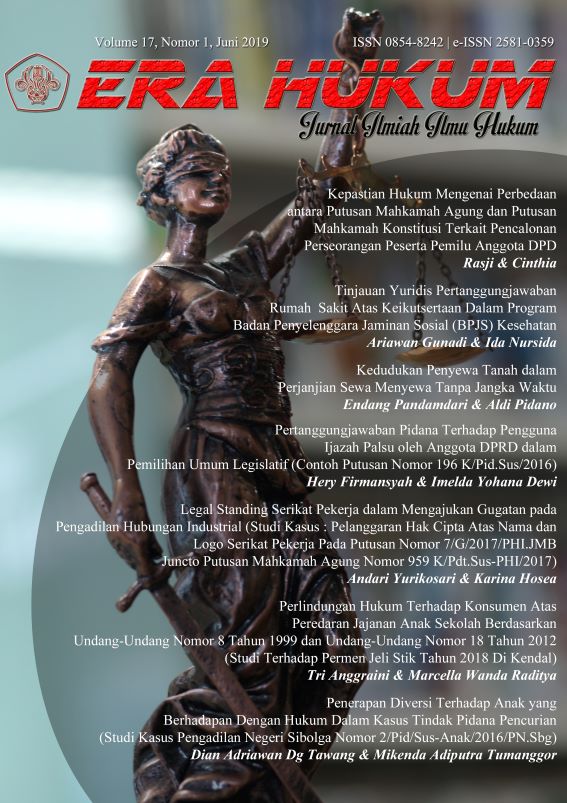KEPASTIAN HUKUM MENGENAI PERBEDAAN ANTARA PUTUSAN MAHKAMAH AGUNG DAN PUTUSAN MAHKAMAH KONSTITUSI TERKAIT PENCALONAN PERSEORANGAN PESERTA PEMILU ANGGOTA DPD
Main Article Content
Abstract
Indonesia is a country based on the law (rechstaat) whose basis is stated in Article 1 Paragraph (3) of the UUD NRI 1945. The essential principles of the rule of law based on Article 24 Paragraph (1) of the UUD NRI 1945 are the guarantee of the organizer of the power of an independent judicial institution without interference from other parties to hold a court to uphold law and justice. Ideally, the results of the two institutions' decisions do not cause problems in society. However, the results of the decisions of the two institutions are still found differently regarding the issue of nominating individual participants in the members of the Regional Representatives Council. Any other way, the results of the Constitutional Court ruling prohibited members of the Regional Representatives Council who were still in the position of administrators of political parties. Meanwhile, the decision of the Supreme Court allows candidates for members of the Regional Representatives Council who are still in the position of managing political parties. In this study, the researcher will examine the differences between the Supreme Court's decision and the Constitutional Court's decision regarding the nomination of individual participants in the Regional Representatives Council by using normative legal methods and conducting interviews as supporting data. The results of the study revealed that based on the legal basis and authority of the institution, the verdict that had legal certainty regarding the nomination of individual participants in the Regional Representatives Council election was the decision of the Constitutional Court.
Article Details
Issue
Section
Penulis yang mempublikasikan jurnal ini setuju dengan ketentuan sebagai berikut:
- Penulis mempertahankan hak cipta dan memberikan jurnal hak publikasi pertama dengan pekerjaan secara bersamaan berlisensi di bawah Creative Commons Attribution yang memungkinkan orang lain untuk berbagi pekerjaan dengan pengakuan kepengarangan karya dan publikasi awal di jurnal ini.
- Penulis mampu untuk masuk ke dalam terpisah, pengaturan kontrak tambahan untuk distribusi non-eksklusif versi diterbitkan jurnal pekerjaan (misalnya, posting ke sebuah repositori institusi atau menerbitkannya dalam sebuah buku), dengan pengakuan publikasi awal di jurnal ini.
- Penulis diizinkan dan didorong untuk mengirim karya mereka secara online (misalnya, dalam repositori institusi atau website mereka) sebelum dan selama proses pengiriman, karena dapat menyebabkan pertukaran produktif, serta sebelumnya dan kutipan yang lebih besar dari karya yang diterbitkan.
References
A. Buku
Sirajuddin dan Winardi. Dasar-Dasar Hukum Tata Negara Indonesia. Malang: Setara Press, 2015.
Handoyo, B. Hestu Cipto. Hukum Tata Negara Indonesia. Yogyakarta: Universitas Atma Jaya Yogyakarta, 2009.
Huda, Ni’Matul. Hukum Tata Negara Indonesia. Jakarta: Raja Grafindo, 2005.
Marzuki, Peter Mahmud. Penelitian Hukum. Jakarta: Kencana Prenada Media Group, 2016.
Mertokusumo, Sudikno dan A. Pitlo. Penemuan Hukum. Bandung: Citra Aditya Bakti, 1993.
Tim Penyusun Hukum Acara Mahkamah Konstitusi. Hukum Acara Mahkamah Konstitusi. Jakarta: Sekretariat Jenderal dan Kepaniteraan Mahkamah Konstitusi Republik Indonesia, 2010.
Tunjung Herming Sitabuana. Penyelesaian Masalah Diskriminasi Terhadap Etnis Cina (Studi Tentang Perkembangan Politik Hukum di Bidang Kewarganegaraan Republik Indonesia). Ringkasan Disertasi Doktor, Universitas Diponegoro, 2011.
B. Artikel Jurnal Online
Faiz, Pan Mohamad. “Serangkut Syarat Calon Anggota DPD’. https://panmohamadfaiz.com/2019/01/10/sengkarut-syarat-calon-anggota-dpd/. Diakses pada tanggal 9 Juni 2019, 12.55 WIB.
C. Perundang-undanganl
Indonesia, Undang-Undang Dasar Negara Republik Indonesia Tahun 1945.
________. Undang-Undang Nomor 14 Tahun 1985 tentang Mahkamah Agung (Lembaran Negara Republik Indonesia Tahun 1985 Nomor 73, Tambahan Lembaran Negara Nomor 1985).
________. Undang-Undang Nomor 24 Tahun 2003 tentang Mahkamah Konstitusi (Lembaran Negara Republik Indonesia Tahun 2003 Nomor 98, Tambahan Lembaran Negara Republik Indonesia Nomor 4317).
________. Undang-Undang Nomor 48 Tahun 2009 tentang Kekuasaan Kehakiman (Lembaran Negara Republik Indonesia Tahun 2009 Nomor 157, Tambahan Lembaran Negara Republik Indonesia Nomor 5076).
________. Peraturan Komisi Pemilihan Umum Nomor 26 Tahun 2018 tentang Perubahan Kedua Atas Peraturan Komisi Pemilihan Umum Nomor 14 Tahun 2018 tentang Pencalonan Perseorangan Peserta Pemilu Anggota DPD.
D. Putusanl
Indonesia. Putusan Mahkamah Konstitusi Nomor 30/PUU-XVI/2018.
________. Putusan Mahkamah Agung Nomor 65P/HUM/2018.

